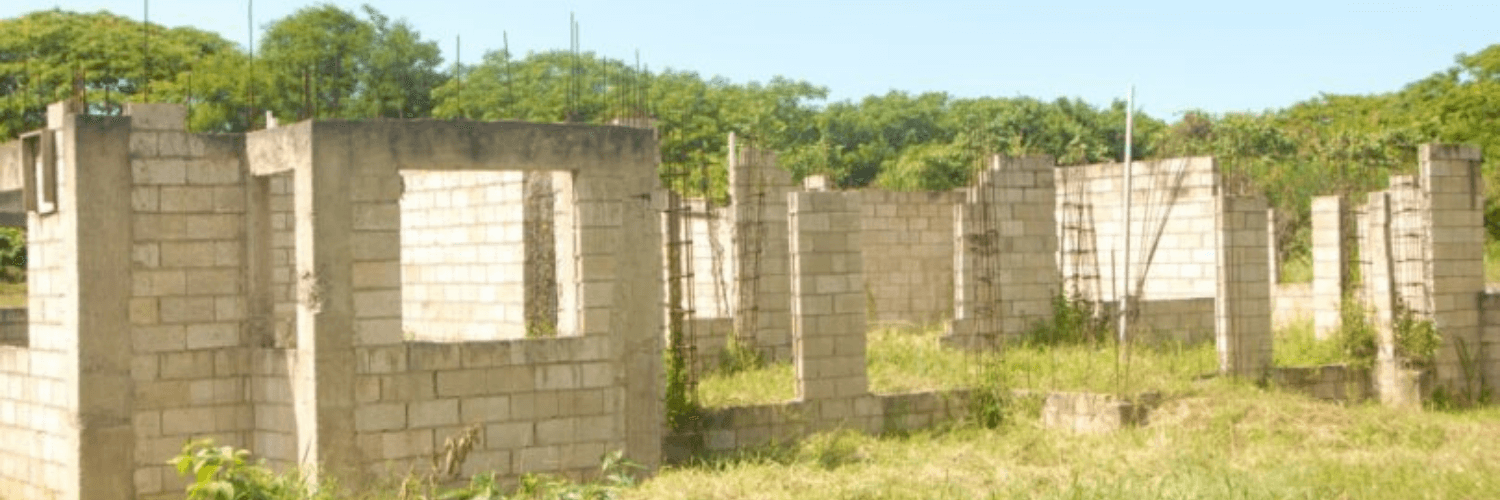 S2K Commerce - Shopping Cart
S2K Commerce - Shopping Cart
 S2K Commerce - Products Dropdown
S2K Commerce - Products Dropdown
 Web Content Viewer
Web Content Viewer

How To Avoid The Financial Trap Of An Unfinished House
You see them across Jamaica: foundations without walls; walls without roofs; floors without tiles; kitchens without fixtures. They are houses or renovations that owners started and are unable to complete for one reason or another. What went wrong with these unfinished houses? For your real estate investment you may be considering adding that extension to your house, building a second house or even doing a small housing development. An unfinished house can result in severe financial loss and even force you to abandon your project. How can you avoid the financial trap of an unfinished house?
Obtain the appropriate Permits
Years ago I encouraged a client to build a vacation villa on his sea view lot in a popular north coast resort and rent it to earn foreign currency. He agreed, and contracted my services as the Project Manager. Three months into the construction, the roof almost completed, swimming pool dug, floors to be tiled. I received a letter from the attorney at law of the resort company. The letter demanded that I cease construction immediately. It claimed that the building was built too close to a boundary, the roof was too high, therefore I breached two covenants on the certificate of title.
The lawyer and resort management arranged a meeting with me and demanded that as a remedy, I must lower the roof and knock off one side of the house or pay them US$10,000 plus legal fees. In reply, I silently reached for my documents and showed them that a year earlier they approved in writing the drawings of the house. A sheepish look of embarrassment fell on their faces as they realized the folly of their claim. The meeting ended. Had I not received their permission the project would have suffered a traumatic blow financially. The lesson is clear, obtain the permits from the appropriate authorities – Parish Council, Ministry of Health, the owner of the development National Environment and Planning Agency (NEPA) – before commencing to build.
Calculate your Costs Carefully
Create a team of professionals. Retain a lawyer to guide you through the restrictive covenants of the certificate of title so you will know what you can and can’t do to the property. Hire an architect to do your drawings. Avoid making changes to the drawings during construction. It can cause unforeseen costs over runs and even negate your permits. Next on your team is a quantity surveyor. He/she will examine the architect’s drawings and quantify the labour and material costs for every requirement of the drawing. Your builder/contractor, whose function is to supervise the construction, completes the makeup of your team.
It’s quite acceptable to negotiate rates and prices with each professional of the team, but proven competence should take preference over merely lower fees. Add 5% for escalation cost as a buffer. You now know the cost of your investment project. You are ready to negotiate the terms of your loan if you are seeking financing or plan your cash flow to coincide with each phase of construction. Scale back on your plans if your budget cannot meet the cost. It’s always best to start modestly and do additions later, than to over extend yourself and unable to complete as scheduled.
Prepare for Surprises
The best plans are often derailed by unforeseen circumstances. Unchecked theft of materials from the site can bleed your funds. Build in a safeguard against theft. If you can’t supervise the construction yourself, hire trusted security. Most financial institutions will insist that you take out a construction insurance policy against natural disasters, injuries, accidents or property damage.. Should any such incidents occur you will be immune from the extra costs
Every unfinished construction project that dots the landscape across the country has its own story of surprise, disappointment, miscalculation or losses. Cost over runs may force you to renegotiate a loan, unexpected delays could cause delayed revenue, stop orders from the authorities can entangle you in costly legal battles and force changes to the building. Plan, prepare and budget carefully so that you may avoid the financial trap of the unfinished house.
Reprinted with permission from Real Estate Investment in Jamaica, by Sydney Davis.



